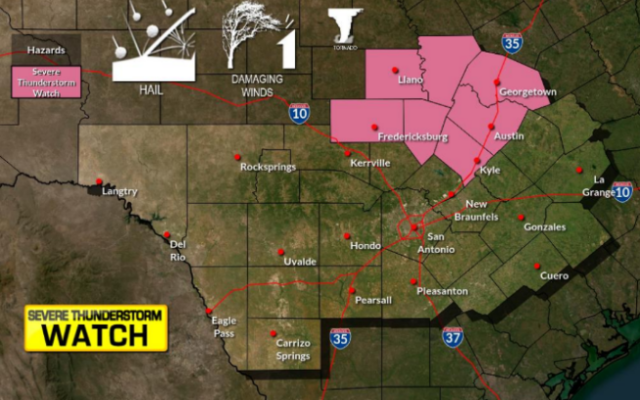Rich father-in-law has helped, complicated O’Rourke’s career

EL PASO, Texas (AP) — Beto O’Rourke was running for the El Paso City Council in 2005 when he asked to meet with the illustrious real estate investor William Sanders.
Sanders had earned a fortune and a reputation as a brilliant businessman in Chicago before returning to his remote hometown on the West Texas-Mexico border. He thought the aspiring politician was there to solicit a donation. But O’Rourke was seeking permission to marry Sanders’ daughter Amy, whom he’d met less than three months before.
“I sat down with him in his office and he was kind of an imposing figure and I was very nervous,” O’Rourke said in a phone interview. After he asked for Sanders’s blessing, it got worse: His future father-in-law spent “a lot of time talking about her previous boyfriend, whom he liked a lot.”
“It was a very awkward — very, very awkward — conversation.”
Thus began a complicated relationship that would color the personal and political life of O’Rourke, now seeking the 2020 Democratic presidential nomination.
Worth at least $500 million according to a conservative Forbes estimate, Sanders has helped make Beto and Amy O’Rourke millionaires. O’Rourke won his city council race and briefly supported an ambitious, though controversial and ultimately unsuccessful, plan to redevelop downtown El Paso that Sanders was leading.
Later, Sanders’ timely donation helped transform his son-in-law from longshot primary challenger to congressman, setting him up to nearly upset U.S. Sen. Ted Cruz last year and catapult him into the presidential race.
The two are both advocates for virtually open U.S. southern borders. While O’Rourke argues it’s a cultural and humanitarian imperative, though, Sanders approaches the issue more as an economic opportunity.
O’Rourke’s campaign says Sanders plays no role — either formal or otherwise — in their candidate’s 2020 bid. Still, O’Rourke, known as a down-to-earth champion of little-guy values, might never have made it on the national stage without the help of an intensely private tycoon who embodies the kind of figure top Democrats now rail against.
“I think Bill has always helped in the background,” said Mike Dipp Jr., an El Paso businessman who has known Sanders for years.
The same year O’Rourke won his city council seat, he married Amy on the sprawling Sanders family ranch near Santa Fe, New Mexico. The former punk rocker said he and Sanders didn’t get along well at first but that he eventually became close to his hard-charging father-in-law, viewing him as a father figure after his own dad died in a 2001 bicycle accident.
By the time O’Rourke came into his life, Sanders had already spent decades at the top of America’s real estate industry, a visionary who spotted trends before others, developed strategies to capitalize on them and built top-notch management teams to execute his plans. He was focused then on industrial developments on both sides of the border, which he believed was the future of manufacturing.
Sanders founded Verde Realty in 2003 to focus on investments in the Southwest, where he believed cheap labor costs and a booming population would make the region thrive. He fostered business relationships in Mexico that envisioned the free flow of goods, people and capital in the most seamless way possible, where the border was little hindrance rather than walled-off.
Journalist Steve Bergsman, who wrote about Sanders in a 2006 book on real estate financing, described him as a workaholic whose vision of making El Paso an industrial powerhouse “really laid the groundwork for Beto’s rise, even before he had probably met or heard of him.”
In the 1990s, Sanders had been dubbed the “Warren Buffett of real estate” for acquisitions and investments that put him in control of a massive portfolio of money-making commercial, industrial and residential properties and made him one of America’s largest landlords.
Investment partnerships tied to Sanders generated more than $780,000 in interest and dividend income for Beto and Amy O’Rourke over the last decade, tax returns show.
Sanders’ wealth has supported virtually all of O’Rourke’s political campaigns — starting with a $250 check for his city council reelection race in 2006. In 2012, a Sanders-owned trust gave $37,500 to a super PAC that worked to help O’Rourke win his congressional seat in an upset. Sanders has given an additional $27,600 to O’Rourke’s congressional, Senate and presidential campaigns starting with that race, while his children and business associates have given O’Rourke tens of thousands more, disclosure filings show.
Still, his presidential campaign is keeping a public distance from Sanders, who donated the maximum $5,600 this election cycle and attended the kickoff rally in El Paso in late March. A spokesman says O’Rourke doesn’t seek Sanders’ advice and that the pair’s interactions are limited to family events.
Sanders now maintains a low public profile and didn’t return phone messages seeking comment. O’Rourke’s presidential campaign didn’t make him available. Many in El Paso’s business community who still have regular contact with Sanders said he wouldn’t want to comment for this story, with some of them agreeing only to speak on background because they feared jeopardizing future working relationships — illustrating just how much Sanders shuns the spotlight while remaining influential.
O’Rourke held a June 10 fundraiser in Chicago, where his father-in-law was one of the most powerful businessmen during the 1980s. The campaign said it had not asked Sanders to help raise money from his contacts in the city, where O’Rourke also raked in cash during last year’s run against Cruz.
After growing up in El Paso and attending Cornell University, Sanders, now 77, founded and built the company that became the renowned La Salle Partners in Chicago. It was a one-stop shop for some of America’s largest corporations for acquiring and managing buildings, land and property. He sold his stake in La Salle in 1989 and left for New Mexico, where his daughter Amy spent most of her childhood.
In the 1990s, Sanders founded the Security Capital Group and built companies that owned warehouses, storage units, office buildings and parking garages. In addition to differing with President Donald Trump’s beliefs about the border, Sanders took a dim view of real estate moguls like Trump who moved from one splashy deal to the next. Sanders purposely avoided skyscrapers in favor of less risky and lower maintenance properties that he considered more lucrative for shareholders.
“I don’t give a darn what a building looks like; I want to be very confident that it is a strategic asset,” he said in a rare 2006 interview published in an industry magazine. “For example, hotels are fabulous, they look good, you walk in and everybody greets you, you are a big shot, but look at the money you have to spend to keep it fresh. It’s a very, very expensive investment. On the other hand, self-storage, you sweep it out, paint it and that is it.”
Sanders, who sold Security Capital for $2.1 billion in 2001, usually relished the low profile such ventures afforded him. That changed less than a year after O’Rourke joined the city council and Sanders led a group of businesspeople who released a plan to redevelop downtown by demolishing old homes and storefronts in favor of new condos, restaurants and a revamped arts district.
Becoming the public face of the project, Sanders modeled his consortium after the powerful Commercial Club of Chicago. O’Rourke supported the plan and initially voted to move it forward. But many low-income, immigrant residents were opposed, saying the redevelopment could displace more than 500 people. It raised the ugly specter of El Paso using eminent domain to displace some of its most marginalized residents while benefiting developers who were part of Sanders’ group.
Critics say O’Rourke had a conflict because of his relationship with Sanders, who promised to donate any of his own profits from his interest in the development to charity. The plan ultimately stalled, and ethics complaints against O’Rourke were dismissed .
Still, the episode has lingered. The conservative Club for Growth Action PAC welcomed O’Rourke to the presidential race in March by releasing an online video accusing him of “doing his father-in-law’s bidding” by supporting “a downtown redevelopment scheme to bulldoze a poor, Hispanic neighborhood while enriching developers.”
O’Rourke has repeatedly denied those charges and noted that he has worked hard to cultivate many supporters in the neighborhoods that would have been most affected. Today, though, even some Democrats question whether O’Rourke is a progressive fighter for the common person as his image would suggest or a tool of powerful business interests.
El Paso attorney Stephanie Townsend Allala once filed a lawsuit accusing the city council of violating state open records laws when discussing the redevelopment plan with private entities. She said O’Rourke consistently backed his father-in-law’s interests and “not once has he supported the grassroots side.”
“It’s a symbiotic relationship. Beto’s standing was aided by his billionaire father-in-law and the billionaire father-in-law was aided by Beto’s standing,” Townsend Allala said. “He’s dancing with the one that brung him, as we say in Texas.”
Sanders started building his fortune as a boy. By 10, he was selling Coca-Cola to golfers on the El Paso Country Club’s 13th hole. “I always wanted both — respect and wealth,” Sanders said, according to the book “The Richest Man in Town: The Twelve Commandments of Wealth.”
Sanders once took the woman who would become O’Rourke’s mom, Melissa Martha Williams, on a double date in 1970 with another couple. Williams instead hit it off with the other man on the date, Pat O’Rourke, and married him less than 12 months later. A year later, the couple’s first child, Beto, was born.
When O’Rourke began a primary challenge to veteran U.S. Democratic Rep. Silvestre Reyes in 2012, Sanders was again there to help. A super PAC, the Campaign for Primary Accountability, was co-founded by a Houston businessman and GOP donor that election cycle to target incumbents from both parties and try to send new faces to Congress. An investment trust controlled by Sanders gave $37,500 to the PAC in the months before the primary. The trust, which owned corporate stocks and a hedge fund, produced $87,000 in income that year for Beto and Amy O’Rourke.
The donations were “probably 10 percent of what we spent” helping O’Rourke and attacking Reyes, PAC strategist Jeff Hewitt said. Others in El Paso donated more than $45,000.
“What happened was, they got a bunch of people in a room in El Paso, it was all Sanders’ buddies and people like that,” said Hewitt, a Democratic operative now based in Ohio. “They knew what we were doing … and they sent some money.”
The group worked to increase Reyes’ unfavorable ratings through digital advertising and other efforts. O’Rourke says he won by simply out-hustling Reyes, noting that he knocked on more than 15,000 doors. He prevailed by fewer than 3,000 votes — a feat Hewitt says would have been impossible if not for outside help.
“He’s the quintessential, ‘Woke up on third and thought he hit a triple’ guy,” Hewitt said of O’Rourke.
You Might Also Like



